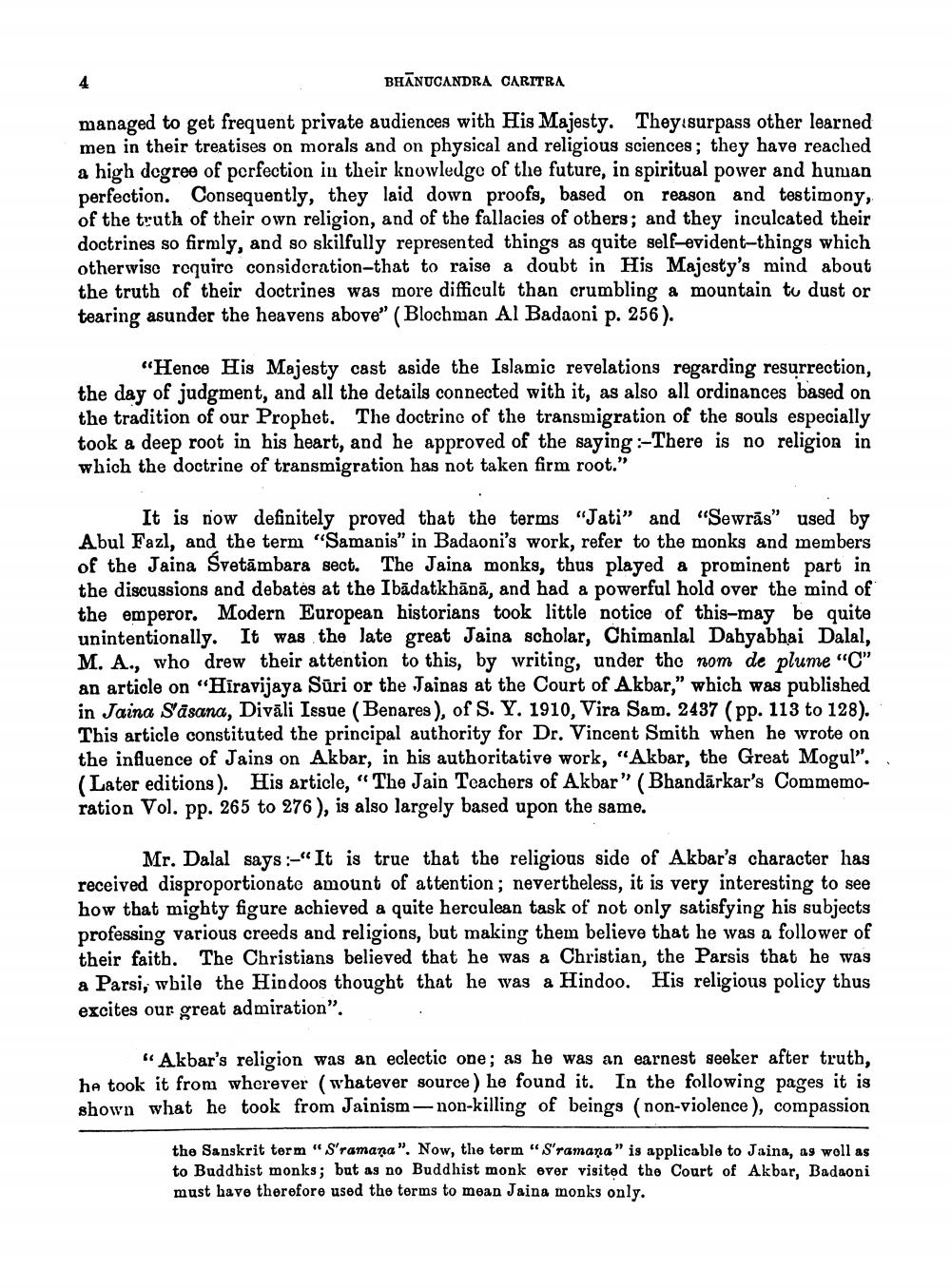________________
BHĀNUCANDRA CARITRA
managed to get frequent private audiences with His Majesty. They surpass other learned men in their treatises on morals and on physical and religious sciences; they have reached a high degree of perfection in their knowledge of the future, in spiritual power and human perfection. Consequently, they laid down proofs, based on reason and testimony, of the truth of their own religion, and of the fallacies of others; and they inculcated their doctrines so firmly, and so skilfully represented things as quite self-evident-things which otherwise require consideration-that to raise a doubt in His Majesty's mind about the truth of their doctrines was more difficult than crumbling a mountain tu dust or tearing asunder the heavens above" (Blochman Al Badaoni p. 256).
"Hence His Majesty cast aside the Islamic revelations regarding resurrection, the day of judgment, and all the details connected with it, as also all ordinances based on the tradition of our Prophet. The doctrine of the transmigration of the souls especially took a deep root in his heart, and he approved of the saying :-There is no religion in which the doctrine of transmigration has not taken firm root."
It is now definitely proved that the terms "Jati" and "Sewrās" used by Abul Fazl, and the term "Samanis” in Badaoni's work, refer to the monks and members of the Jaina Svetāmbara sect. The Jaina monks, thus played a prominent part in the discussions and debatės at the Ibādatkhānā, and had a powerful hold over the mind of the emperor. Modern European historians took little notice of this-may be quite unintentionally. It was the late great Jaina scholar, Chimanlal Dahyabhai Dalal, M. A., who drew their attention to this, by writing, under the nom de plume "C" an article on "Hiravijaya Sūri or the Jainas at the Court of Akbar," which was published in Jaina S'asana, Divāli Issue (Benares), of S. Y. 1910, Vira Sam. 2437 (pp. 113 to 128). This article constituted the principal authority for Dr. Vincent Smith when he wrote on the influence of Jains on Akbar, in his authoritative work, "Akbar, the Great Mogul".. (Later editions). His article, “The Jain Teachers of Akbar" (Bhandārkar's Commemoration Vol. pp. 265 to 276 ), is also largely based upon the same.
Mr. Dalal says:-"It is true that the religious side of Akbar's character has received disproportionate amount of attention; nevertheless, it is very interesting to see how that mighty figure achieved & quite herculean task of not only satisfying his subjects professing various creeds and religions, but making them believe that he was a follower of their faith. The Christians believed that he was a Christian, the Parsis that he was a Parsi, wbile the Hindoos thought that he was a Hindoo. His religious policy thus excites our great admiration".
"Akbar's religion was an eclectic one; as he was an earnest seeker after truth, he took it from wherever (whatever source ) he found it. In the following pages it is shown what he took from Jainism-non-killing of beings (non-violence), compassion
the Sanskrit term "S'ramana". Now, the term "S'ramaņa" is applicable to Jaina, as woll as to Buddhist monks; but as no Buddhist monk ever visited the Court of Akbar, Badaoni must have therefore used the terms to mean Jaina monks only.




